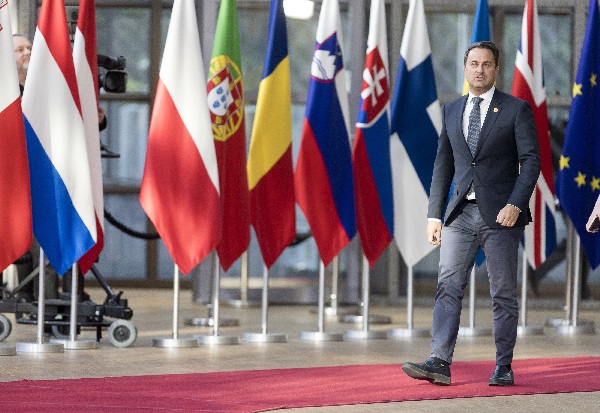 PM Xavier Bettel at the extraordinary meeting of the European Council (Article 50) in Brussels yesterday;
Credit: SIP/Thierry Monasse, all rights reserved
PM Xavier Bettel at the extraordinary meeting of the European Council (Article 50) in Brussels yesterday;
Credit: SIP/Thierry Monasse, all rights reserved
Just ahead of Wednesday's European Council (Article 50) meeting, the European Commission evaluated its preparations for a "no deal" Brexit and a coordinated EU approach.
Regarding a united approach in the event of a "no deal" Brexit, the Commission has issued practical guidance to Member States in five areas: citizens' residence and social security entitlements; data protection; medicine; police and judicial cooperation; fisheries. The aim of this guidance was to ensure the smooth practical implementation of EU and national contingency measures, if the United Kingdom were to leave the EU without a deal on 12 April (which will no longer be the case) or indeed at a later date.
The Commission has recognised that a "no deal" withdrawal will cause disruption, but has maintained that the EU is fully prepared for such an outcome. As outlined by President Juncker in the European Parliament on 3 April 2019, should a "no deal" scenario occur, the UK would be expected to address three main separation issues as a precondition before the EU would consider embarking on discussions about their future relationship: protecting and upholding the rights of citizens who have used their right to free movement before Brexit; honouring the financial obligations the UK has made as a Member State; preserving the letter and spirit of the Good Friday Agreement and peace on the island of Ireland, as well as the integrity of the internal market.
Returning to the guidance areas listed above, the Commission first reiterated the priority that is protecting the rights of UK citizens in the EU, and EU citizens in the UK, in a "no deal" scenario. Indeed, the EU27 Member States have prepared national contingency measures to ensure continued legal residence in the immediate aftermath of such an outcome for UK citizens residing legally in the EU27. Yesterday's guidance provided an overview of the EU's contingency measures, notably the contingency Regulation on Social Security Coordination. However, the Commission has proposed that Member States adopt a unilateral coordinated approach to address some issues not covered by the Regulation.
Secondly, the Commission reiterated that, in a "no deal" scenario, the EU's legal framework on police and judicial cooperation would cease to apply to the UK. Cooperation with the UK will therefore have to be based on alternative legal frameworks and cooperation mechanisms, based on international and national law. Wednesday's guidance outlined the relevant fallback instruments that the EU and its Member States can rely on to ensure that law enforcement and judicial cooperation can continue in order to guarantee a continued high level of security for citizens. It also provided guidance to Member States on the disconnection of the UK from various EU databases, networks and information systems.
In regards to the medical sector, considered a priority in the Commission's preparations from the start, recent guidance built on that already issued in July 2017. Thanks to preparedness measures, the majority of medicinal products concerned by the UK's withdrawal should now be compliant with EU legislation as of the UK's withdrawal date. It is possible, however, that some may not be compliant in time. There is, therefore, a risk of shortages if economic operators do not act swiftly to remedy the situation. The most recent guidance highlighted how the Commission will work with the European Medicines Agency (EMA) and national medicines regulators to monitor the situation closely and address any potential problems. It also outlines the possibilities for making use of exemptions available from the existing rules, in order to mitigate the risk of shortages in case of a "no deal".
Concerning data protection the Commission reiterated its opinion that the existing tools under the General Data Protection Regulation for data exchange with third countries are sufficient to cater for the immediate needs of data transfers to the UK in a "no deal" scenario. Yesterday's guidance provided details on these tools, the conditions for making use of derogations, as well as on the practical steps that EU companies and authorities will have to take to ensure continued compliance with the EU's data protection rules.
Finally, the EU has adopted two contingency measures in the area of fisheries to cover all scenarios under a "no deal" Brexit. On the one hand, the EU has created the appropriate legal framework to allow UK vessels reciprocal access to EU waters throughout 2019, if the UK grants such access to EU vessels in its waters. On the other hand, the EU has also adjusted the eligibility criteria of the Fisheries and Maritime Fund, to ensure that fishermen who have to cease their activities (in case the UK does not grant continued access to its waters) can receive compensation. In such a case, it would be essential that Member States adopt a coordinated approach (outlined in the guidance) to ensure a level playing field between EU fishermen in different Member States and to protect marine resources.
To date, the Commission has tabled nineteen legislative proposals, eighteen of which have been adopted or agreed by the European Parliament and Council. The Commission has also published 92 sector-specific preparedness notices with detailed guidance to the different sectors affected by Brexit. These proposals are temporary in nature, limited in scope and will be adopted unilaterally by the EU. The Commission has also held extensive technical discussions with the EU27 Member States both on general issues of preparedness and contingency work and on specific sectorial, legal and administrative preparedness issues. Nevertheless, yesterday's publication reminded that the EU's contingency measures will not mitigate the overall impact of a "no deal" scenario.








